
In the UK, GCSEs (General Certificate of Secondary Education) are considered one of the most important tests a student faces.
Besides preparing students for next academic or work phases, they help students improve their critical thinking and problem-solving.
Yet, reviewing so many different subjects, each full of details, can feel very challenging. And you can obviously take my word for not being alone in this.
However, revision can really become easy and even enjoyable if you have a smart plan.
The following piece will offer you the best tips for revision. These tricks can surely help you feel stronger, remember things for longer and save time.
These guidelines apply whether you’re just about to start or are nearing your exams. They will make sure you’re calm and help you to refine your studies.
Contents
- Top 10 Effective GCSE Revision Techniques
- 1. Begin and Set a Plan
- 2. Create SMART Targets
- 3. Try Active Revision Methods
- 4. Choose to Work on Your Shortcomings
- 5. Use Breaks Throughout Time (The Pomodoro Technique)
- 6. Explore Different Resources
- 7. Use Timed Conditions When Doing Practice Papers
- 8. Work as a Group but Be Smart
- 9. Get Organised and Avoid Distractions
- 10. Look After Yourself Physically and Mentally
- Final Tips and Words of Encouragement
- In Conclusion
Top 10 Effective GCSE Revision Techniques
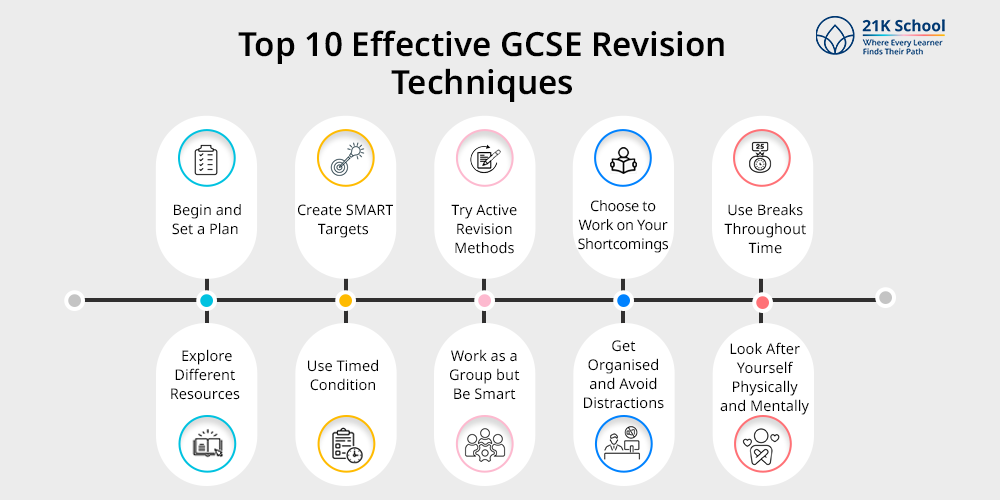
1. Begin and Set a Plan
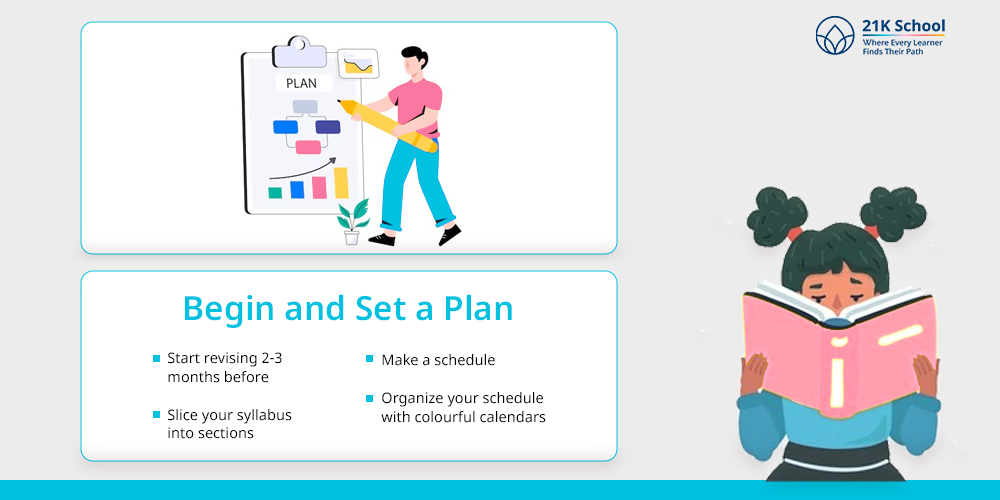
One thing students tend to do wrong is wait until the last moment to prepare for their tests. While cramming works for a quick review, you won’t remember or learn much for very long.
Tips for Starting Your Planning in Advance:
- Start revising 2-3 months before taking your exams.
- Slice your syllabus into sections that are easier to digest.
- Make a schedule for revising every subject and topic you have learned.
- You can organize your schedule with colourful calendars or apps such as MyStudyLife and Trello.
Starting in advance will allow you to study well, find out your challenges and go over tricky topics again several times. And yes, don’t forget to make a personalized study routine.
2. Create SMART Targets
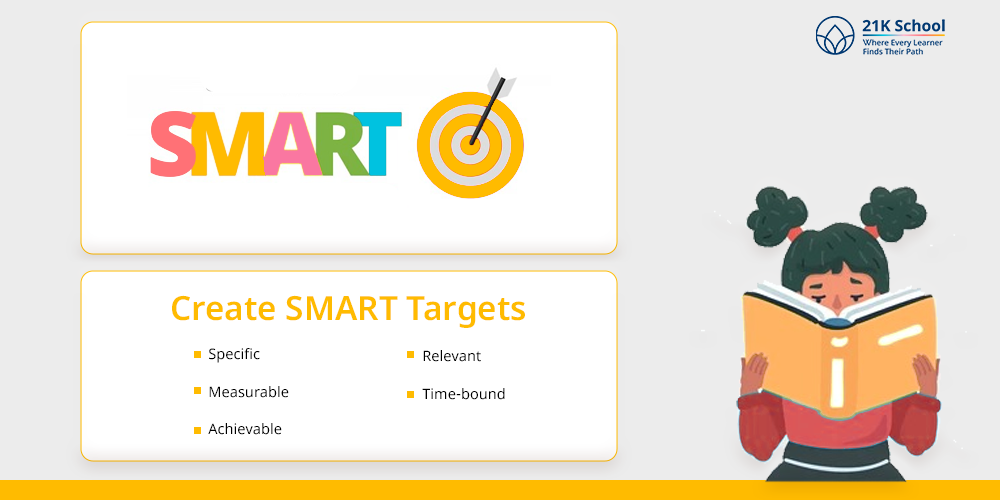
Just deciding to “study more” isn’t very helpful. Try to make your goals SMART.
- Specific: Know what you should be studying (for example, “Photosynthesis” in Biology).
- Measurable: Use quizzes or past topics to see how your child’s progress is going.
- Achievable: Give yourself 2-3 solid hours for the best results each day.
- Relevant: Study what you have had difficulties with the most.
- Time-bound: Block out set blocks of time, for example, set aside from 4:00-5:00 to review algebra.
Having clear and set goals keeps you motivated and helps prevent becoming tired.
Also read, what is a smart classroom ?
3. Try Active Revision Methods
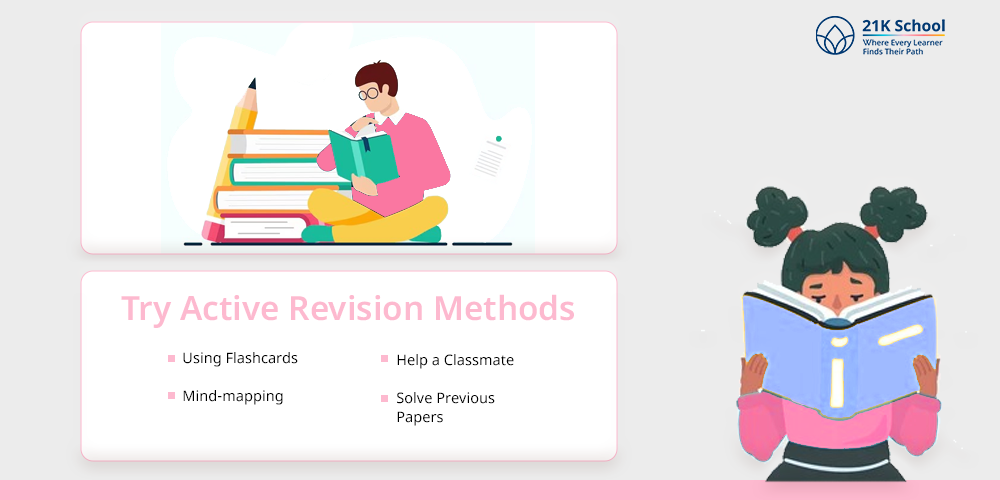
You will not remember information well if you only read from a textbook or copy notes out. Rather, choose active study strategies that make your brain work on what you are learning.
Methods that Work:
- Using Flashcards: Simply sign up for Anki or Quizlet and begin flashcard revision. Having flashcards is good to help memorise important terms, dates and equations.
- Mind-mapping: A lot of students prefer mapping out the main ideas and the ways they link to each other.
- Help a Classmate: You remember what you learn even better when you guide a friend through a topic.
- Solve Previous Papers: Test your skills using previous GCSE papers found on websites such as AQA or OCR. Match your work with the answers given in the mark scheme.
Applying active revision methods helps you remember information and deal more effectively with questions in the exam.
Here are some top tips for making your revision easy.
4. Choose to Work on Your Shortcomings

It’s normal to spend more time studying subjects you already know. To get the most benefit from your session, turn your attention to your less-strong subjects.
You can assess yourself using a traffic-light style approach:
- Green: Sure of the topics covered
- Yellow: You need some more explanation.
- Red: Extensive upgrades must be done.
Focus more with your learning efforts on the red areas. Dealing with these weaknesses gives you the greatest boost to your overall performance.
5. Use Breaks Throughout Time (The Pomodoro Technique)
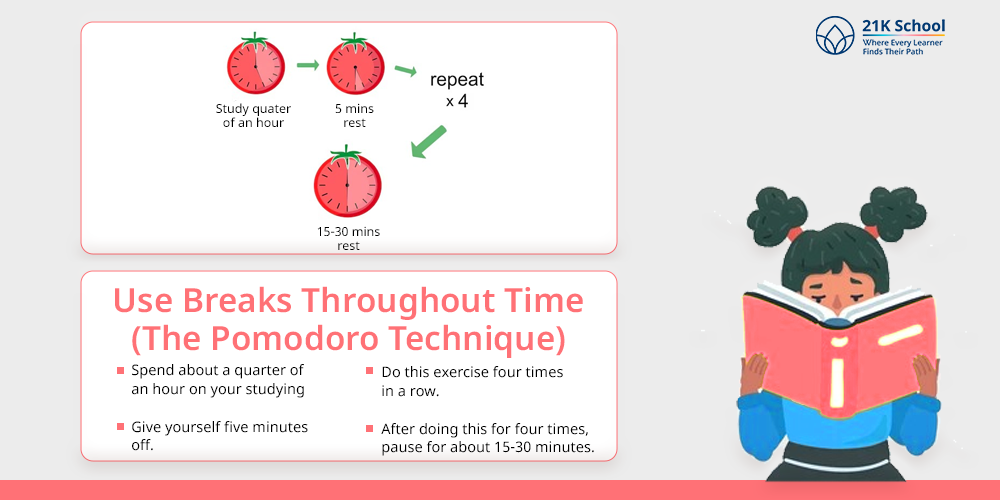
Working without breaks for a long time can make you tired and less focused. The Pomodoro Technique helps you control your time and builds your concentration.
The way this works:
- Spend about a quarter of an hour on your studying.
- Give yourself five minutes off.
- Do this exercise four times in a row.
- After doing this for four times, pause for about 15-30 minutes.
Thanks to this method, you can accomplish more and stay motivated. The pomodoro technique works best for learning time-management skills.
6. Explore Different Resources
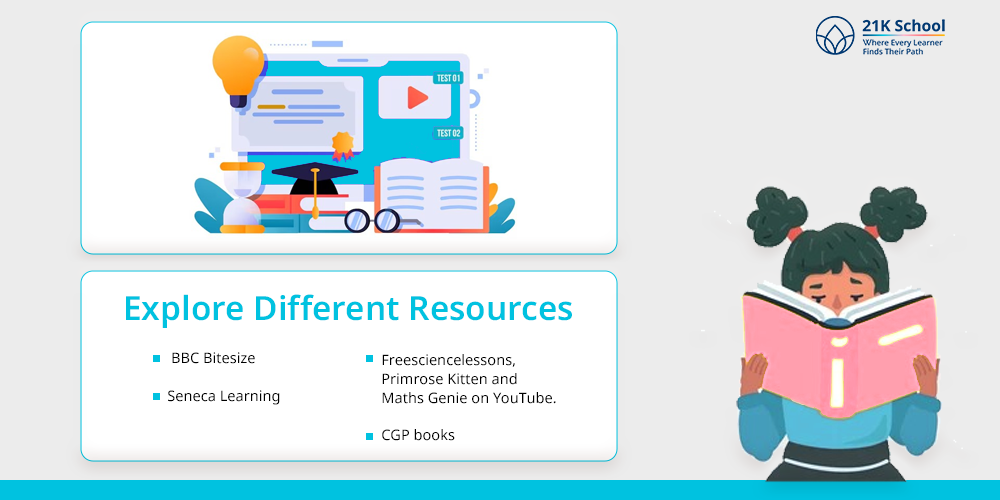
You can access GCSE content in different ways. Use more than your class notes. Or you can see different training materials to help you understand subjects that are difficult for you.
There are a lot of useful resources present online:
- On BBC Bitesize you will find short and specialized explanations of the content.
- Seneca Learning lets you play learning games to help you remember.
- Visual learners will appreciate Freesciencelessons, Primrose Kitten and Maths Genie on YouTube.
- CGP books are a favorite because they line up with what is examined on tests and are recommended by exam boards.
Resource mixing makes learning more engaging and fits the needs of all learners.
7. Use Timed Conditions When Doing Practice Papers
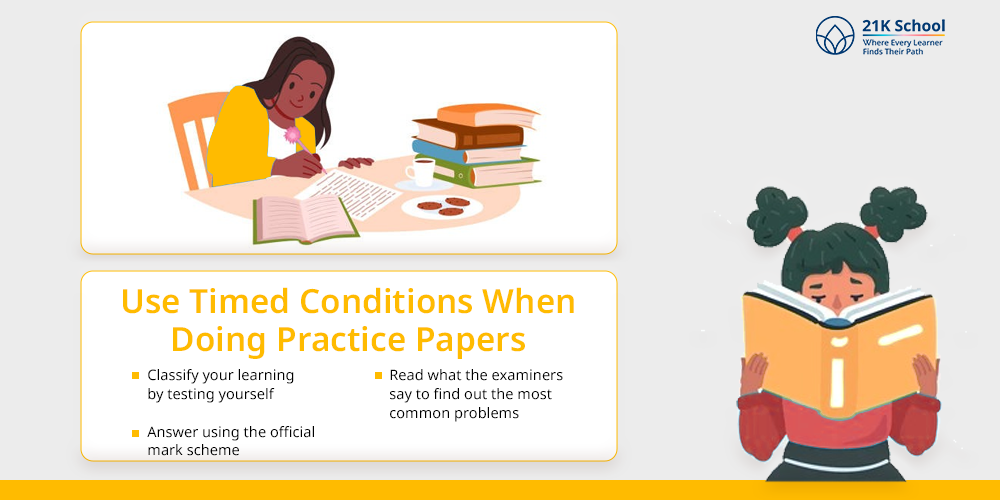
You haven’t finished revising until you use what you’ve studied. Seeing old question papers teaches you the style of the exam and what you need to do to get the highest mark.
Three Ways to Use Them Most Effectively:
- Classify your learning by testing yourself quietly without notes, making sure to finish in the time allowed.
- Answer using the official mark scheme and make your marks honestly.
- Read what the examiners say to find out the most common problems and how to solve them.
Every day, try to work through common problems in the subject: This will help you feel more prepared for the real exam.
8. Work as a Group but Be Smart
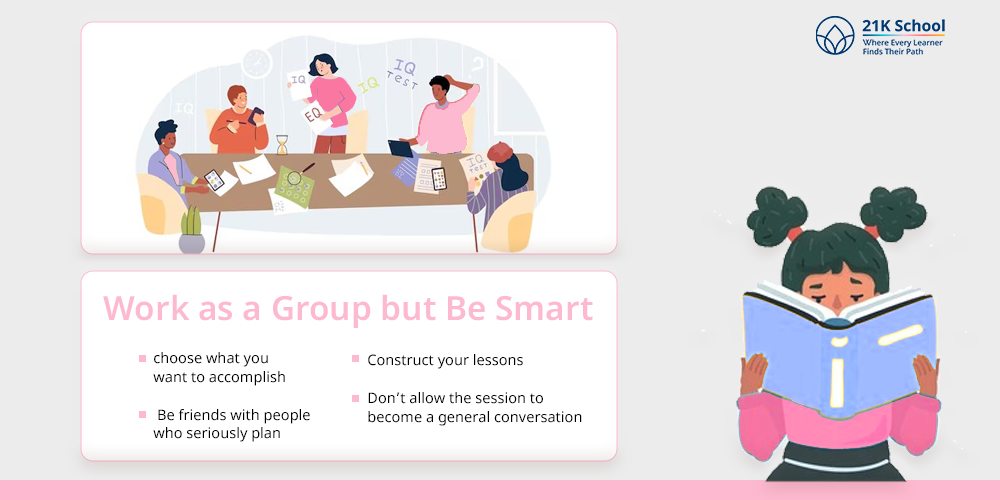
Sharing study time with friends can suit you if you do it the right way. With online group projects, students learn together, consider alternative viewpoints and stay responsible.
Ways to improve your time in a study group:
- Be sure to choose what you want to accomplish for every session.
- Try to be friends with people who seriously plan their studies.
- Construct your lessons by taking it in turns to teach one another.
- Don’t allow the session to become a general conversation. Keep your attention on the topic.
Discussing subjects such as English Literature or History is much easier in a study group.
9. Get Organised and Avoid Distractions
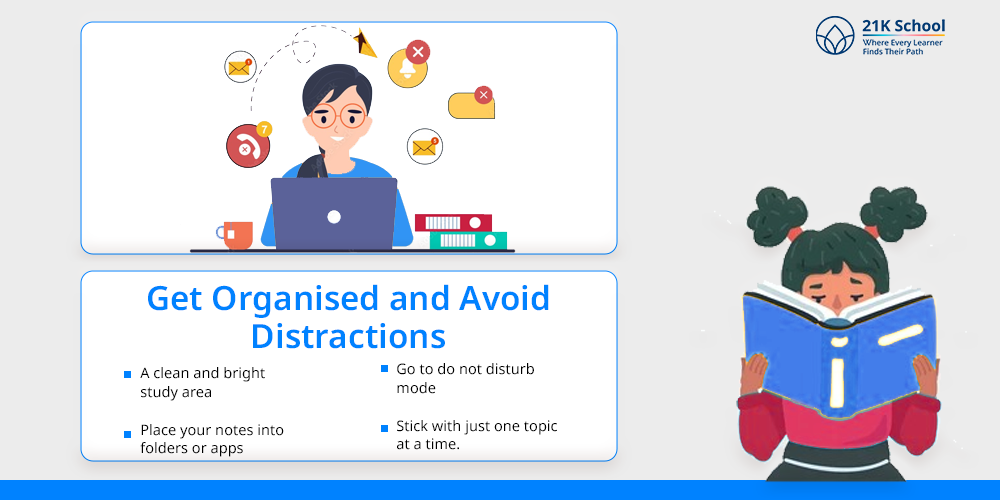
When your desk is messy and you keep seeing notifications, thus making it harder to focus on your work. Set up your space so it encourages concentration.
Tips for keeping things organised:
- A clean and bright study area will improve your learning experience.
- Place your notes into folders or apps based on the subject you are studying.
- Go to do not disturb mode or else try apps like Forest or Focus Keeper.
- Trying to work on different topics at once will distract you from the main idea. Therefore, stick with just one at a time.
And it won’t be too much to say that a clean environment raises a tidy mind.
10. Look After Yourself Physically and Mentally
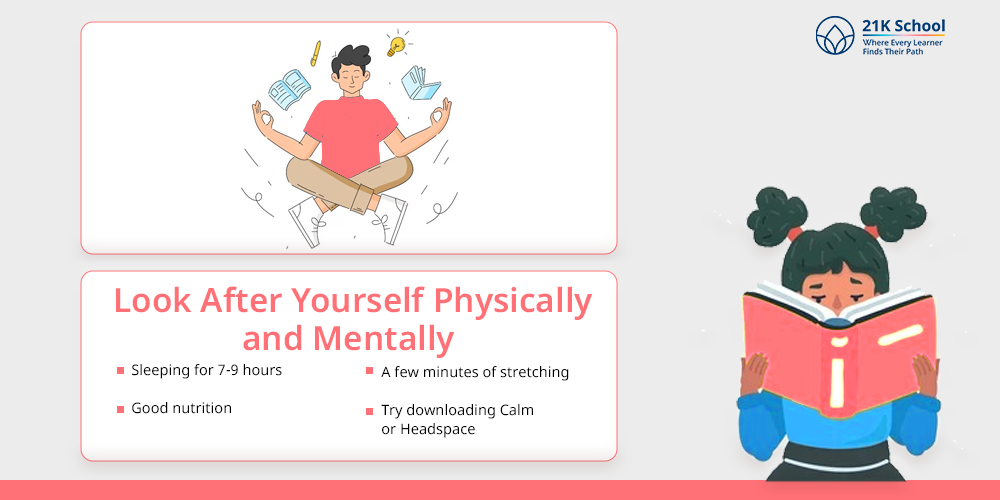
Studying and performing well in exams depends a lot on how healthy you are. Therefore, it is crucial for you to take care of your personal health.
Wellbeing tips are as:
- Sleeping for 7-9 hours each night benefits your body. When you don’t get enough sleep, your memory and concentration may weaken.
- Good nutrition means eating food that is well-balanced. Good options for the brain are nuts, leafy vegetables and fish.
- A few minutes of stretching will be enough to get your brain back on track.
- Try downloading Calm or Headspace to help relax your mind and lower stress.
Give your health attention. Your brain needs both time to rest and good food to work properly.
Final Tips and Words of Encouragement
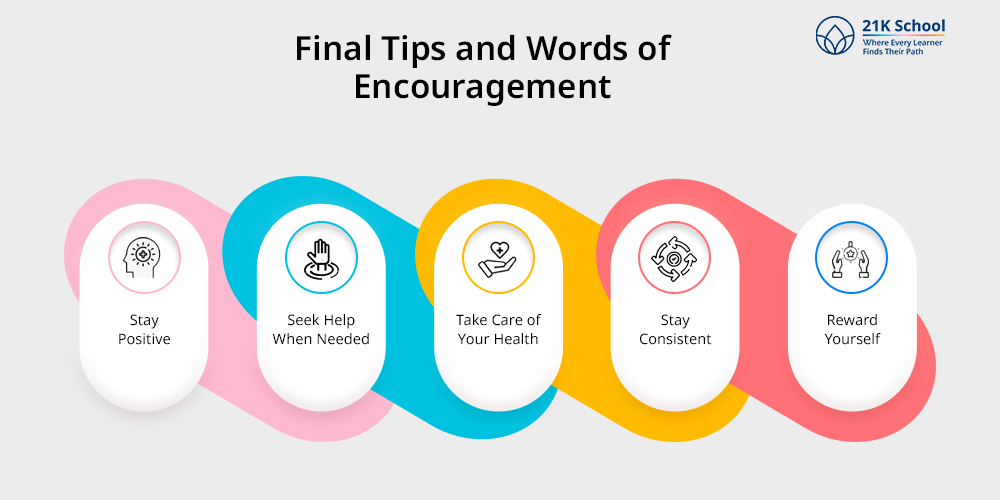
Preparing for GCSE exams can be challenging, but with the right strategies, it is manageable. Here are some final tips to keep in mind:
- Stay Positive: Always be encouraged with studying and learning. Do not doubt your abilities and do not lose your confidence.
- Seek Help When Needed: In case you have some problems travelling through some innate sections or chapters, do not hesitate to look for help either from teachers or tutors or even friends.
- Take Care of Your Health: You should sleep well and eat well; also, do exercise at least half of the time. It is very essential to take good care of your health so that when it is needed the most your body helps you to stay in the battle of life’s ups and downs. Always remember health is wealth.
- Stay Consistent: Consistency is the most important aspect of the revision. Regular study sessions are more effective than last-minute cramming.
- Reward Yourself: It is useful to establish incentives for achieving the established study objectives or for passing the test. It works as a motivation and makes the revision easier and fun to do.
In Conclusion
Revising for your GCSEs doesn’t have to include stress. If you make a plan, use clever strategies and keep up the effort, you can really benefit from studying.
Begin at an early stage, stay busy, focus on your weak points and use every resource around you. Remember to focus on your health and mental strength all through the process.
Don’t forget that GCSEs help lead you forward, even if they aren’t the ultimate aim. What’s most important is to build habits and learn skills that will help you in many different situations.
Work hard, keep your confidence and let the process take its course. You’re ready to ace your exams!
